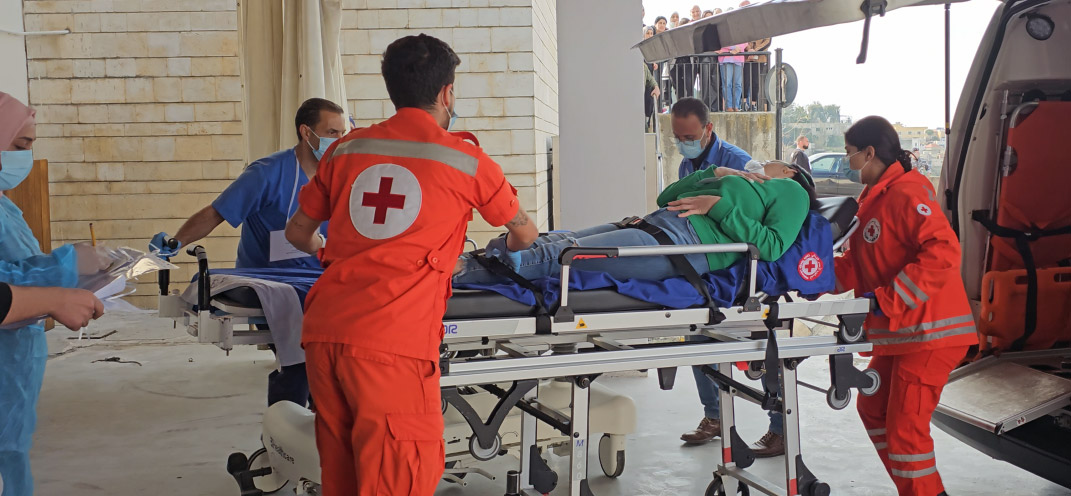
4 March 2024 – From afar, it would seem like the ambulances rushing injured people to the Emergency Unit at Sibline Governmental Hospital, near the southern town of Saida, were working in the midst of a violent war. Fortunately, however, this was only a drill, successfully coordinated with relevant stakeholders such as the hospital staff, the Lebanese Red Cross, Sibline municipality, the Security General, and the local community.
The mass casualty management drill was part of preparations for any acute emergency with mass casualties that could affect Lebanon’s health system. This is part of hospital preparedness and readiness for mass casualties as organized by the Ministry of Public Health’s Public Health Emergency Operations Centre (PHEOC) with technical support from WHO.
Under the International Health Regulations (2005), WHO has been supporting the Ministry to strengthen hospitals’ readiness and preparedness to respond to any health emergency in the country. WHO also extended support to the establishment and operationalization of the PHEOC.
Recently activated by the Minister of Health, the PHEOC has begun work to enhance the health emergency response, with the centre’s hospital task force leading on hospital preparedness and response. Using standard WHO tools, the task force completed an on-site rapid hospital readiness assessment for 48 hospitals in high-, medium- and low-risk areas. It also supported a further 52 hospitals to complete a self-assessment for hospital readiness.
Based on the assessment findings, the Ministry developed the Trauma Response Plan, working with WHO and other stakeholders. Its primary aim is to minimize morbidity and mortality rates related to mass casualty events through prompt and efficient trauma care. Frontline health workers have since received advanced capacity-building training organized by the Ministry, WHO, and others to enhance their knowledge and skills. Hospitals taking part in the training were required to draft or update their mass casualty management plan and test it through a practical drill.
A practical drill took place at Sibline Governmental Hospital in the presence of the health minister, Spanish ambassador, and WHO representative as well as the hospital management and staff, and officials from the local community. The drill was a success, and many staff actively participated in the exercise.
 After the drill, Minister of Health Dr Firass Abiad, speaking to the hospital management and staff, said: “Unfortunately, there has been aggression against our people, which has led to the loss of many civilians, including health workers and children. Today’s drill exercise is part of our responsibility to be better prepared to save our people in case of an emergency.”
After the drill, Minister of Health Dr Firass Abiad, speaking to the hospital management and staff, said: “Unfortunately, there has been aggression against our people, which has led to the loss of many civilians, including health workers and children. Today’s drill exercise is part of our responsibility to be better prepared to save our people in case of an emergency.”
Dr Abiad went on to praise the management and the staff of the hospitals for their commitment to better preparedness. He explained that the Ministry is working on a health coverage project for health workers in hospitals. He also applauded Sibline Hospital for its role during the COVID-19 pandemic. Dr Abiad acknowledged the support provided by WHO, the Lebanese Red Cross, and the Spanish government to enhance Lebanon’s emergency preparedness and response capabilities.
The Government of Spain provided financial support to enhance hospital preparedness and readiness in Lebanon. Spanish Ambassador to Lebanon Dr Jesus I. Santos Aguado, who took part in the drill, stated: “Lebanon is one of the priority countries in the region, and the Government of Spain puts a high priority on saving lives and strengthening public health systems. We value the partnership with the Ministry of Public Health and WHO to enhance hospital readiness.”
Dr Abdinasir Abubakar, WHO Representative in Lebanon, commended the joint efforts made by the Ministry of Public Health and WHO Lebanon and said: “We are making greater efforts to improve the capacity of frontline hospitals for managing mass casualty events. Through PHEOC, WHO will continue to support the mass casualty drills being conducted in frontline hospitals to ensure the hospitals’ readiness.” Dr Abubakar acknowledged and appreciated the Government of Spain’s generous support.
The functionality and operation of the PHEOC must be maintained to enhance coordination and support for emergency preparedness and response across the country. WHO remains committed to supporting the Ministry of Public Health to strengthen hospitals’ readiness and preparedness to respond to any health emergency in the country, especially given the ongoing crisis in south Lebanon.


